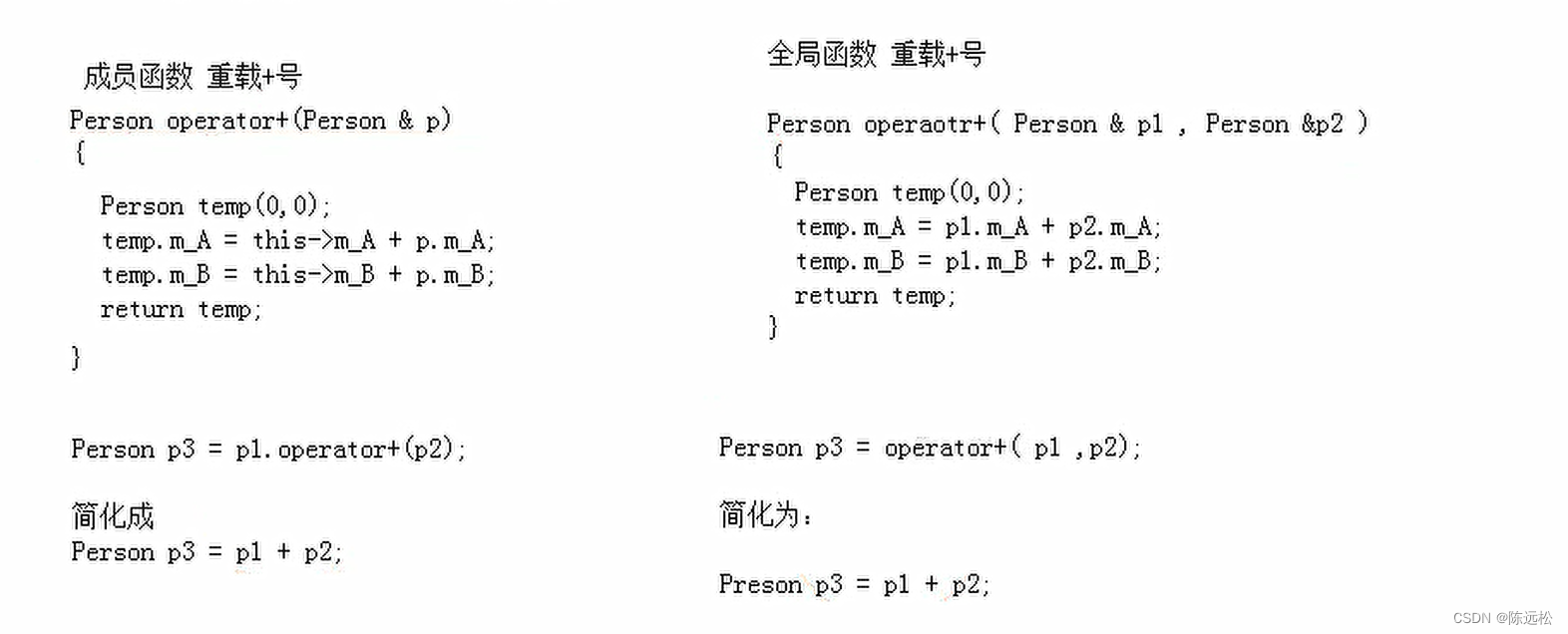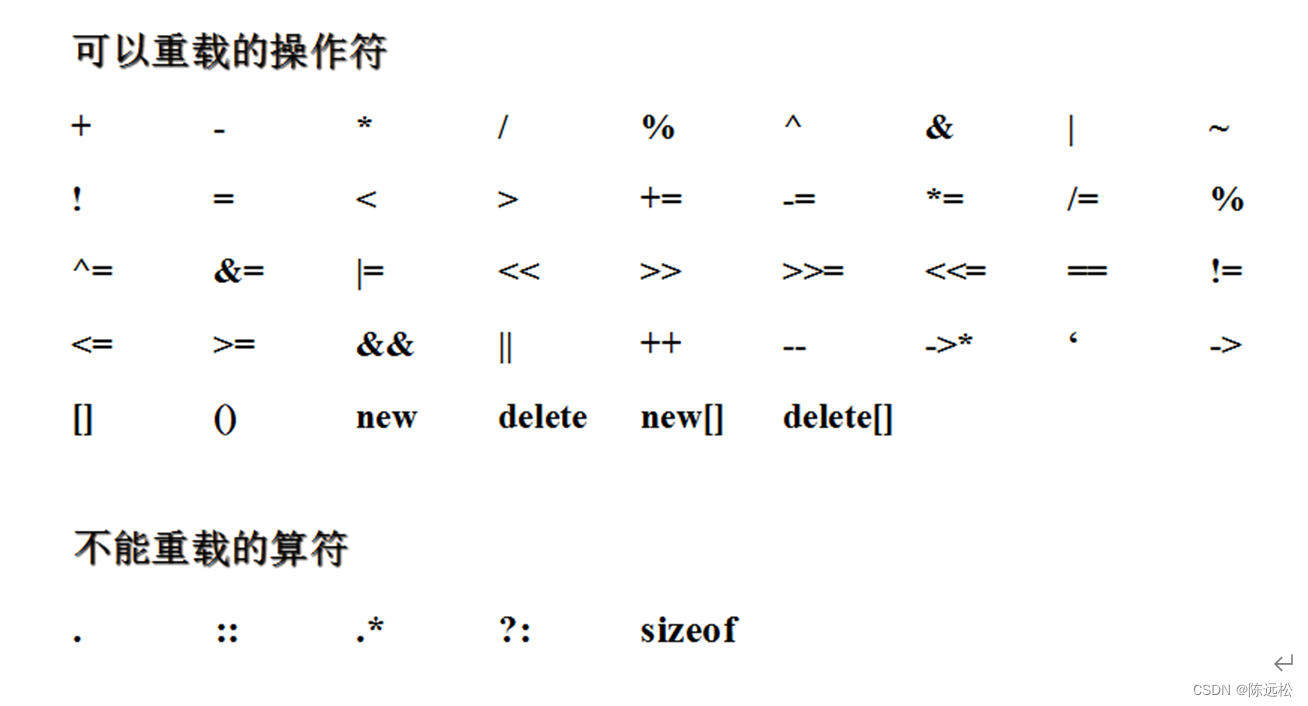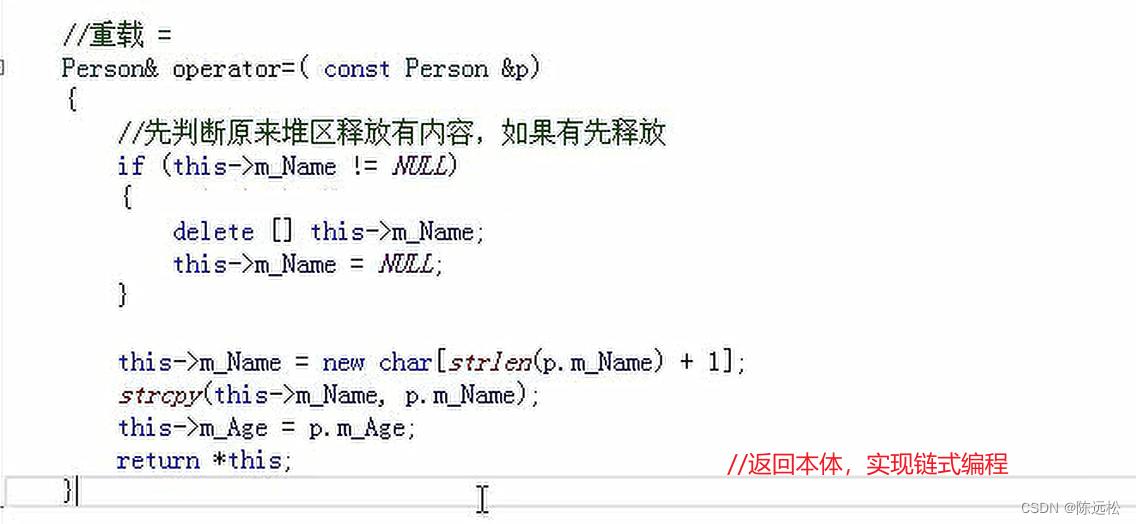C++ 运算符重载 (备查)
发布时间:2023年12月17日
基础
运算符重载,就是对已有的运算符重新进行定义,赋予其另一种功能,以适应不同的数据类型。
运算符重载也可以发生函数重载。
语法:
void operator@(); //@代表了被重载的运算符。
函数的参数个数取决于两个因素。
1)运算符是一元(一个参数)的还是二元(两个参数);
2)运算符被定义为全局函数(对于一元是一个参数,对于二元是两个参数)
还是成员函数(对于一元没有参数,对于二元是一个参数-此时该类的对象用作左耳参数)
成员函数重载 + 全局函数重载 原理

运算符重载(operator overloading)只是一种”语法上的方便”,也就是它只是另一种函数调用的方式。
是否可重载

几乎C中所有的运算符都可以重载,但运算符重载的使用时相当受限制的。
不能改变运算符优先级,不能改变运算符的参数个数。
加号(+)运算符重载
//利用成员函数实现加号运算符重载
Person operator+(Person &p)
{
Person temp;
temp.m_A = this->m_A + p.m_A;
temp.m_B = this->m_B + p.m_B;
return temp;
}
private:
int m_A;
int m_B;
//利用全局函数实现加号运算符重载
Person operator+(Person &p1, Person &p2)
{
Person temp;
temp.m_A = p1.m_A + p2.m_A;
temp.m_B = p1.m_B + p2.m_B;
return temp;
}
重载左移操作符(<<),使得 cout 可以输出自定义对象
为什么不用 成员函数重载 实现

使用 全局函数 重载 << 运算符(无法链式编程)

cout 是 ostream 类的对象,全局只有一个,所以使用 & 。
要实现 cout 链式输出需返回 cout 引用

如果要访问类中私有属性,配合友元实现
//重载 << 运算符案列
class Person{
friend ostream& operator<<(ostream& os, Person& person);//友元
public:
Person(int id,int age){
mID = id;
mAge = age;
}
private:
int mID;
int mAge;
};
//重载 << 运算符
ostream& operator<<(ostream& os, Person& person){
os << "ID:" << person.mID << " Age:" << person.mAge;
return os;
}
int main(){
Person person(1001, 30);
//cout << person; //cout.operator+(person)
cout << person << " | " << endl;
return EXIT_SUCCESS;
}
自增自减(++/–)运算符重载
class Complex{
public:
Complex(){
mA = 0;
mB = 0;
}
//重载前置++
Complex& operator++(){
mA++;
mB++;
return *this; //返回的的是引用,可以实现链式编程:(++(++b))
}
//重载后置++
Complex operator++(int){
Complex temp;
temp.mA = this->mA;
temp.mB = this->mB;
mA++;
mB++;
return temp; //temp是局部对象,不能返回引用,所以不能实现链式编程。
}
//前置--
Complex& operator--(){
mA--;
mB--;
return *this;
}
//后置--
Complex operator--(int){
Complex temp;
temp.mA = mA;
temp.mB = mB;
mA--;
mB--;
return temp;
}
private:
int mA;
int mB;
};
如何区分重载的前置++还是后置++,通过占位参数来区分,有 int 的为后置++,- - 同理。
要优先使用前缀形式,由于前缀形式少创建了一个临时对象,效率经常会略高一些。
指针运算符( *、-> )重载
利用智能指针,管理 new 出来的 Person 的释放操作。
//被维护的类
class Person{
public:
Person(int param){
this->mParam = param;
}
void PrintPerson(){
cout << "Param:" << mParam << endl;
}
private:
int mParam;
};
//智能指针
class SmartPointer{
public:
SmartPointer(Person* person){
this->pPerson = person;
}
//重载指针的 -> 操作符
Person* operator->(){
return pPerson;
}
//重载指针的 * 操作符
Person& operator*(){
return *pPerson;
}
~SmartPointer(){
if (pPerson != NULL){
delete pPerson; //在析构中释放 被维护对象空间
this.pPerson = NULL;
}
}
public:
Person* pPerson; //维护一个被管理类的指针
};
void test01(){
SmartPointer pointer(new Person(18)); //通过构造,实例化被被维护的对象
//本质:pointer->->PrintPerson(); 编译器简化为:pointer->PrintPerson();
pointer->PrintPerson();
(*pointer).PrintPerson();
}
智能指针类 执行在栈上,执行完后自动释放,同时也释放了被维护对象的空间。
自动释放体现出:智能
指针运算符( * ,-> )重载体现出: 指针
赋值(=)运算符重载
编译器 默认给一个类提供四个函数:默认构造,拷贝构造(浅拷贝),析构函数 ,operator= (浅拷贝)。

//赋值(=)运算符重载-------详细案列
class Person{
friend ostream& operator<<(ostream& os,const Person& person){
os << "ID:" << person.mID << " Age:" << person.mAge << endl;
return os;
}
public:
Person(int id,int age){
this->mID = id;
this->mAge = age;
}
//重载赋值运算符
Person& operator=(const Person& person){
this->mID = person.mID;
this->mAge = person.mAge;
return *this;
}
private:
int mID;
int mAge;
};
//1. =号混淆的地方
void test01(){
Person person1(10, 20);
Person person2 = person1; //调用拷贝构造
//如果一个对象还没有被创建,则必须初始化,也就是调用构造函数
//上述例子由于person2还没有初始化,所以会调用构造函数
//由于person2是从已有的person1来创建的,所以只有一个选择
//就是调用拷贝构造函数
person2 = person1; //调用operator=函数
//由于person2已经创建,不需要再调用构造函数,这时候调用的是重载的赋值运算符
}
//2. 赋值重载案例
void test02(){
Person person1(20, 20);
Person person2(30, 30);
cout << "person1:" << person1;
cout << "person2:" << person2;
person2 = person1;
cout << "person2:" << person2;
}
//常见错误,当准备给两个相同对象赋值时,应该首先检查一下这个对象是否对自身赋值了
//对于本例来讲,无论如何执行这些赋值运算都是无害的,但如果对类的实现进行修改,那么将会出现差异;
//3. 类中指针
class Person2{
friend ostream& operator<<(ostream& os, const Person2& person){
os << "Name:" << person.pName << " ID:" << person.mID << " Age:" << person.mAge << endl;
return os;
}
public:
Person2(char* name,int id, int age){
this->pName = new char[strlen(name) + 1];
strcpy(this->pName, name);
this->mID = id;
this->mAge = age;
}
#if 1
//重载赋值运算符
Person2& operator=(const Person2& person){
//注意:由于当前对象已经创建完毕,那么就有可能pName指向堆内存
//这个时候如果直接赋值,会导致内存没有及时释放
if (this->pName != NULL){
delete[] this->pName;
}
this->pName = new char[strlen(person.pName) + 1];
strcpy(this->pName,person.pName);
this->mID = person.mID;
this->mAge = person.mAge;
return *this;
}
#endif
//析构函数
~Person2(){
if (this->pName != NULL){
delete[] this->pName;
}
}
private:
char* pName;
int mID;
int mAge;
};
void test03(){
Person2 person1("John",20, 20);
Person2 person2("Edward",30, 30);
cout << "person1:" << person1;
cout << "person2:" << person2;
person2 = person1;
cout << "person2:" << person2;
}
等于和不等于(==、!=)运算符重载
class Complex{
public:
Complex(char* name,int id,int age){
this->pName = new char[strlen(name) + 1];
strcpy(this->pName, name);
this->mID = id;
this->mAge = age;
}
//重载==号操作符
bool operator==(const Complex& complex){
if (strcmp(this->pName,complex.pName) == 0 &&
this->mID == complex.mID &&
this->mAge == complex.mAge){
return true;
}
return false;
}
//重载!=操作符
bool operator!=(const Complex& complex){
if (strcmp(this->pName, complex.pName) != 0 ||
this->mID != complex.mID ||
this->mAge != complex.mAge){
return true;
}
return false;
}
~Complex(){
if (this->pName != NULL){
delete[] this->pName;
}
}
private:
char* pName;
int mID;
int mAge;
};
void test(){
Complex complex1("aaa", 10, 20);
Complex complex2("bbb", 10, 20);
if (complex1 == complex2){ cout << "相等!" << endl; }
if (complex1 != complex2){ cout << "不相等!" << endl; }
}
函数调用符号()重载——(仿函数)
class Complex{
public:
int Add(int x,int y){
return x + y;
}
int operator()(int x,int y){
return x + y;
}
};
void test01(){
Complex complex;
cout << complex.Add(10,20) << endl;
//对象当做函数来调用
cout << complex(10, 20) << endl;
//使用匿名对象 用完立即释放
cout << complex()(10, 20) << endl;
}
不要重载&&、||
不能重载 operator&& 和 operator|| 的原因是,无法在这两种情况下实现内置操作符的完整语义。(即:不能实现短路特性)
符号重载建议

=, [], () 和 -> 操作符只能通过成员函数进行重载
<< 和 >>只能通过全局函数配合友元函数进行重载
不要重载 && 和 || 操作符,因为无法实现短路规则
文章来源:https://blog.csdn.net/CYS_2020/article/details/134992075
本文来自互联网用户投稿,该文观点仅代表作者本人,不代表本站立场。本站仅提供信息存储空间服务,不拥有所有权,不承担相关法律责任。 如若内容造成侵权/违法违规/事实不符,请联系我的编程经验分享网邮箱:chenni525@qq.com进行投诉反馈,一经查实,立即删除!
本文来自互联网用户投稿,该文观点仅代表作者本人,不代表本站立场。本站仅提供信息存储空间服务,不拥有所有权,不承担相关法律责任。 如若内容造成侵权/违法违规/事实不符,请联系我的编程经验分享网邮箱:chenni525@qq.com进行投诉反馈,一经查实,立即删除!
最新文章